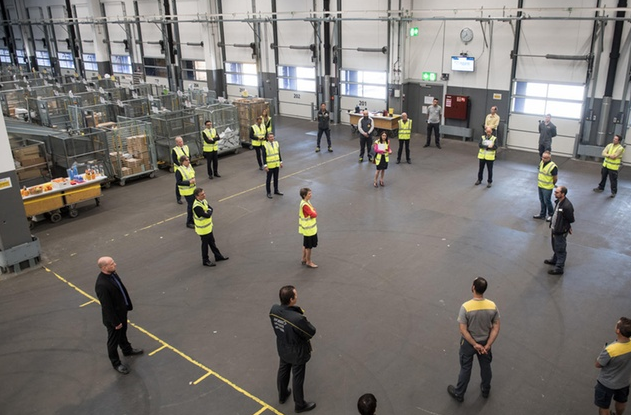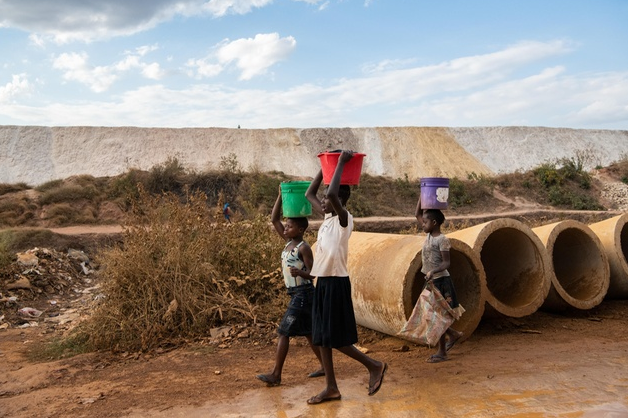Is this what the new normal looks like for business? (Keystone / Alessandro Crinari) “Our analysis of what the biggest global companies in Switzerland are up to. This week: the new normal for business, luxury watches, and biotech dilemmas.” Switzerland is easing up on the lockdown but what the new normal looks like for big companies is still a work in progress. Last week, the Swiss government announced it was taking its foot off the brakesexternal link and re-opening the economy on the condition that we all behave ourselves. But the good behaviour rules for hair salons – one of the first sectors to re-open its doors – can’t exactly be copy-pasted into a code of conduct for big multinational companies like Nestlé and LafargeHolcim. While the government has
Topics:
Swissinfo considers the following as important: 3.) Swiss Info, 3) Swiss Markets and News, Business, Featured, newsletter
This could be interesting, too:
Nachrichten Ticker - www.finanzen.ch writes Die Performance der Kryptowährungen in KW 9: Das hat sich bei Bitcoin, Ether & Co. getan
Nachrichten Ticker - www.finanzen.ch writes Wer verbirgt sich hinter der Ethereum-Technologie?
Martin Hartmann writes Eine Analyse nach den Lehren von Milton Friedman
Marc Chandler writes March 2025 Monthly

Is this what the new normal looks like for business? (Keystone / Alessandro Crinari)
“Our analysis of what the biggest global companies in Switzerland are up to. This week: the new normal for business, luxury watches, and biotech dilemmas.”
Switzerland is easing up on the lockdown but what the new normal looks like for big companies is still a work in progress.
Last week, the Swiss government announced it was taking its foot off the brakesexternal link and re-opening the economy on the condition that we all behave ourselves. But the good behaviour rules for hair salons – one of the first sectors to re-open its doors – can’t exactly be copy-pasted into a code of conduct for big multinational companies like Nestlé and LafargeHolcim.
While the government has guidelinesexternal link, there is plenty of uncharted territory.
Should you require suppliers to distribute masks? Who is going to police the coffee breaks? Do you track the movements of infected employees? Do you mandate testing of factory workers? And what happens if someone is infected?
Some companies like Novartis are releasing their own guidanceexternal link for business partners operating during the pandemic. Nestlé is providing free mealsexternal link and transport for employees in factories and distribution centres to help reduce the risk they fall ill.
But all of the legal grey areas can create trouble. A couple of weeks ago the Swiss newspaper Neue Zürcher Zeitung reported that the managing director of Glencore’s mining subsidiary in Zambia was detained leaving the countryexternal link, which the company told the paper was in response to the company’s decision to temporarily stop operating because of the coronavirus crisis. (The company has just announced it has restarted operationsexternal link for 90 days.)
They aren’t the only ones that have had to halt operations. Trafigura’s mine operator Chemaf in the Democratic Republic of the Congo had to dial back, impacting a promising project with informal miners that helped eliminate child labour on the site.
Children may indeed be one of the tragic casualties of the crisis as experts warn that the pandemic could lead to a spike in child labourexternal link in West Africa, where nearly 70% of the world’s cocoa is produced, as schools close and monitors stay away.
In other news:
Luxury watchmakers in Switzerland are also taking a beating. Just as the luxury watch industry was poking its head out after the pro-democracy protests in Hong Kong, it saw exports drop more than 20% in March. But, as the New York Times points out, what lies ahead could be even more perilousexternal link as consumers may think twice about a luxury watch when they are busy stockpiling toilet paper.
But it’s the small players that are struggling the most. This is true in watchmaking but also in another of Switzerland’s prized sectors: biotech. While several biotech companies are working on Covid-19 vaccines and treatments, others are on the brink as clinical trials stall, crippling financing prospects. Some 70% of biotechs in Switzerland are too small to be a start-up yet too big to make money, virtually shutting them out of federal emergency loans.
Switzerland is emerging as a big fish in the fight against Covid-19. Over the weekend, Roche’s new antibody test received emergency approval in the US. Swiss drugmaker Lonza also signed a big deal with Moderna to be the manufacturing muscleexternal link behind its potential vaccine. The big lingering question is not only which one will make it to the end but also who is first in line to receive itexternal link.
Got a tip or a story idea? Send me a message at [email protected]
Thanks for reading and stay safe.
Tags: Business,Featured,newsletter








